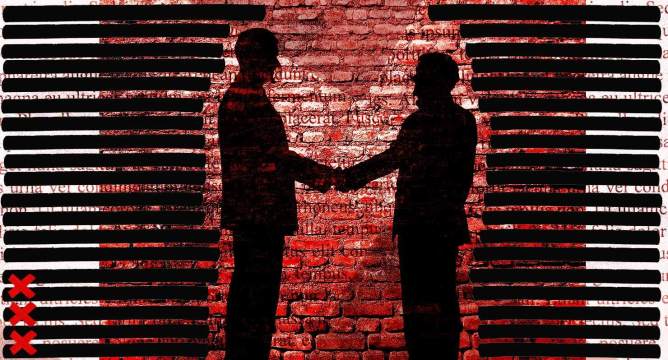This article is an instalment in a new series, Punted, on the government’s failure to reform gambling advertising.
There’s a common misconception that the government’s consideration of regulation of gambling ads is about gambling. “The Albanese government needs to find the courage to stand up to gambling companies and do what’s right,” ACT Senator David Pocock said after the media reported that the government was considering a cap on ads rather than a full ban. “[Communications Minister] Michelle Rowland is giving the gambling giants pretty much what they want,” said independent MP Zoe Daniel.
In fact gambling companies are strongly divided on banning advertising, as recommended by last year’s inquiry headed by the late Peta Murphy. One of the biggest companies, Tabcorp, told Murphy’s inquiry “there is too much gambling advertising. There should be further restrictions on when and where gambling advertising occurs” and offered its own voluntary ban on TV ads. It now supports an outright ban. A key gambling lobby peak body, the Australian Hotels Association, is entirely agnostic on a ban since its members do little or no advertising. Clubs Australia wants much tougher regulation of online gambling.
There’s no altruism in those positions. Tabcorp is a powerful incumbent in online sports gambling, and its market power would be entrenched by any gambling ad ban, which would make it very difficult for new market entrants to compete with it. Poker machine venues compete with online gambling for the gambling dollar, and are at a disadvantage in that people have to physically come to them to lose money; online gambling enables you to throw money away from the comfort of your own couch with your phone. Some of the “gambling giants” Zoe Daniels refers to in fact would be perfectly happy if the government accepted Murphy’s recommendations and went ahead with a comprehensive ban.
But then this is not a story about gambling. It’s about the media. If there’s intense division among the gambling industry, there’s none within Australia’s corporate media: they all oppose a ban on broadcast gambling advertising — though they would be perfectly happy with a ban on social media advertising, thank you.
The primary argument from the broadcasters is that they desperately need advertising revenue, which has collapsed over the past 15 years and is now just a fraction of what it was before social media appeared. This is not like banning tobacco advertising or tobacco sponsorship, which occurred in the analog era when the networks had a lock on eyeballs and ad revenue. Now, Ten is a basket case; Seven is trading at just 17 cents; Nine is limping along at a post-pandemic low; all of them, and News Corp, have been serially shedding staff including journalists. Removing the $200 million in gambling ad revenue is another kick in the guts for an industry on life support.
You might spot the sleight-of-hand here — the big media companies are conflating two different issues: the collapse of their defunct broadcast advertising-based business model and their resulting inability to fund journalism, and the toxic social impact of ready access to online gambling on sports. The corporate media argument is basically “let us do a little damage to society because it will enable us to do some good for society via journalism”.
The response from any rational government would be to call out this conflation and separate the issues. Is a gambling advertising ban worthwhile on its own merits? The community view appears to be strong support for such a ban. Is there evidence it would work? There is evidence that exposure to gambling ads increases people’s propensity to gamble, even if they haven’t done so before. Moreover, the cliché that advertisers don’t spend money for nothing surely applies.
Regardless of where you end up on the ad ban issue — you might be a libertarian who thinks that if people are stupid enough to waste their money gambling, that’s on them, governments have no business banning ads for anything that’s not illegal — the problem of how we fund journalism is very different. Currently, public interest journalism is funded two ways: government funding via the national broadcasters and grants for small media outlets and the AAP, or as a by-product of ad revenue from the dying business models of Nine, Ten and some radio networks (News Corp and Seven are in a different business of inciting hatred and grievance to gather eyeballs — the former successfully, the latter an utter failure).
The government should thus get to grips with the question of whether it lets corporate media continue to die or intervenes by expanding the government funding model to all public interest journalism outlets. Some have suggested a digital media platform tax of some kind to fund it — i.e. to establish a compulsory version of the news media bargaining code shakedown. But that’s still another issue being shoehorned into the debate by people with an axe to grind on Meta. Ultimately it will be taxpayer funding, regardless of the incidence of any tax measures.
One outcome might be a complete ban on gambling advertising coupled with a new public interest journalism grants scheme to replace the disappearing ad revenue large media companies need. The only intersection would be that the gambling ad ban had crystallised the existential problem of advertising revenue for corporate media. Otherwise, gambling will continue as before. Just ask gambling giants like Tabcorp or the clubs and pubs lobbyists.
Anyone affected by problem gambling can get immediate assistance by calling the National Gambling Helpline on 1800 858 858 for free, professional and confidential support 24 hours a day, seven days a week.
Should the government fund public interest journalism to help commercial news break its gambling money addiction? Let us know your thoughts by writing to [email protected]. Please include your full name to be considered for publication. We reserve the right to edit for length and clarity.
